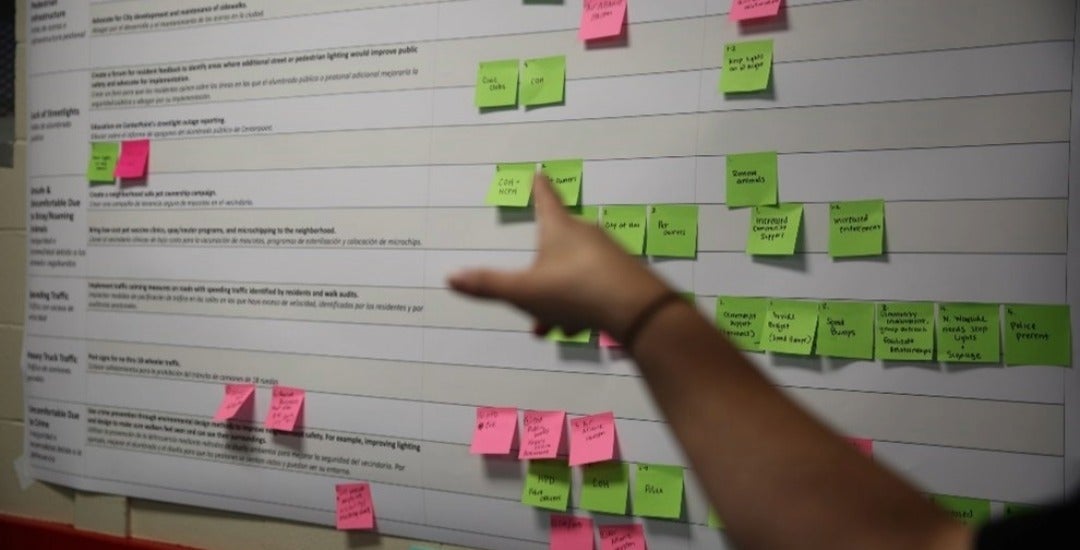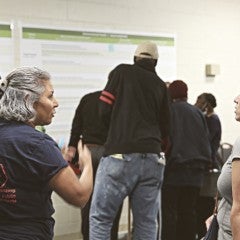When Texas A&M doctoral candidate Jacquita Johnson visited 80 women from northeast Houston’s Settegast neighborhood, she repeatedly heard horror stories about water.
Renters living in apartment complexes told Johnson they lose water multiple times a week, sometimes without warning. Many said they regularly fill their bathtubs with water to cook or flush toilets.
Those living in houses, meanwhile, complained about potentially contaminated floodwaters frequently filling roadside ditches that run through the majority-Black neighborhood.
“Houston as an entire city experiences environmental injustice,” said Johnson, who conducted the interviews as part of her doctorate dissertation. “But we need to look at the issue by neighborhood. Since it’s a geographically small neighborhood, Settegast gets left out of the conversation a lot. It gets lost in the larger conversation about northeast Houston.”
Settegast’s numerous environmental issues — including faulty drainage, industrial pollution, landfill hazards and proximity to a long-contaminated railyard — and history of housing discrimination spurred local leaders to create a community action plan published in 2023.
Now, resident volunteers in Settegast, home to roughly 4,400 people, are taking it upon themselves to gradually carry out the plan through the Northeast Coalition for Advancement and Transformation, which they established last year.
In recent months, the coalition, led by residents Sade Hogue, Kyle Maronie, Kourtney Revels and Jordan Williams, has hosted community support meetings on housing, maternal health and other topics. Johnson, now a doctor of public health, also has assisted the coalition by leading a soil sampling project in Settegast, aiming to identify possible connections between chronic illnesses and possible contamination from lead and arsenic.
“We’re focused on becoming a trusted, reliable organization based in Settegast,” Maronie said. “Ultimately, we want to help move the plan forward and improve the health and well-being of long-term residents. We’re running our leg of the race so the next generation can pick up the baton.”
Settegast’s unhealthy history
Settegast has the lowest life expectancy in Harris County at 65.7 years old, according to federal estimates. Community members have well-above-average rates of asthma, lung disease, high blood pressure, obesity and diabetes.
In 2021, the Urban Land Institute, a nonprofit based in Washington, D.C., awarded a grant to its Houston branch to address health equity in the region. Three other organizations — Harris County Public Health, the Houston Land Bank and the Kinder Institute for Urban Research — later joined to conduct research and help craft a Settegast action plan alongside residents.
The 60-page plan released two years later set lofty, long-term goals. Among them were preventing foreclosures, predatory speculative home buying and illegal dumping. It also included calls to action for city and county officials to improve access to goods and services, education, employment, mobility, and parks and recreation spaces in Settegast.
“I am of the firm belief that everything ties back to health. … We think about everything through the lens of, ‘How will this make our communities healthier in Settegast and northeast Houston?’” Maronie said.
Ultimately, the plan’s designers envisioned Settegast residents leading the work alongside community partners, using their recommendations as a road map.
The Northeast Coalition for Advancement and Transformation, which emerged following the plan’s release, received implementation funding from the Urban Land Institute. Texas Southern University awarded the coalition a $10,000 grant to place a community health worker in Settegast earlier this year.
“Community health workers are essential, because they can relate culturally to the community and serve as trusted resources,” Maronie said. “The community health worker helps advance and educate the community around environmental issues in the neighborhood.”
A community-led approach
Maronie said implementing the plan will be a “big lift” and take years to complete. The coalition hopes to partner with local government agencies, nonprofits and academic institutions to carry it out.
Johnson’s soil sampling of 30 locations, which was analyzed by an independent environmental testing laboratory, marked an early milestone for the coalition.
The assessment found one potentially problematic spot for lead, based on federal environmental standards, which the coalition hopes to further explore. Lead exposure can stunt brain development in children and cause heart complications in adults, among other effects.
Coalition members also have identified assembling the people, skills, relationships and structures needed to carry out the plan long term as a priority. As members continue to follow the action plan, they want to ensure that health equity efforts are led by the residents of Settegast.
“It feels like we're in our infancy, but we have a really strong foundation,” Maronie said. “We’re trying to take ownership of the plan from a community perspective. Bringing community (in) on the ground level of operational planning, of grants or research projects is how it needs to happen. That’s the best practice.”


